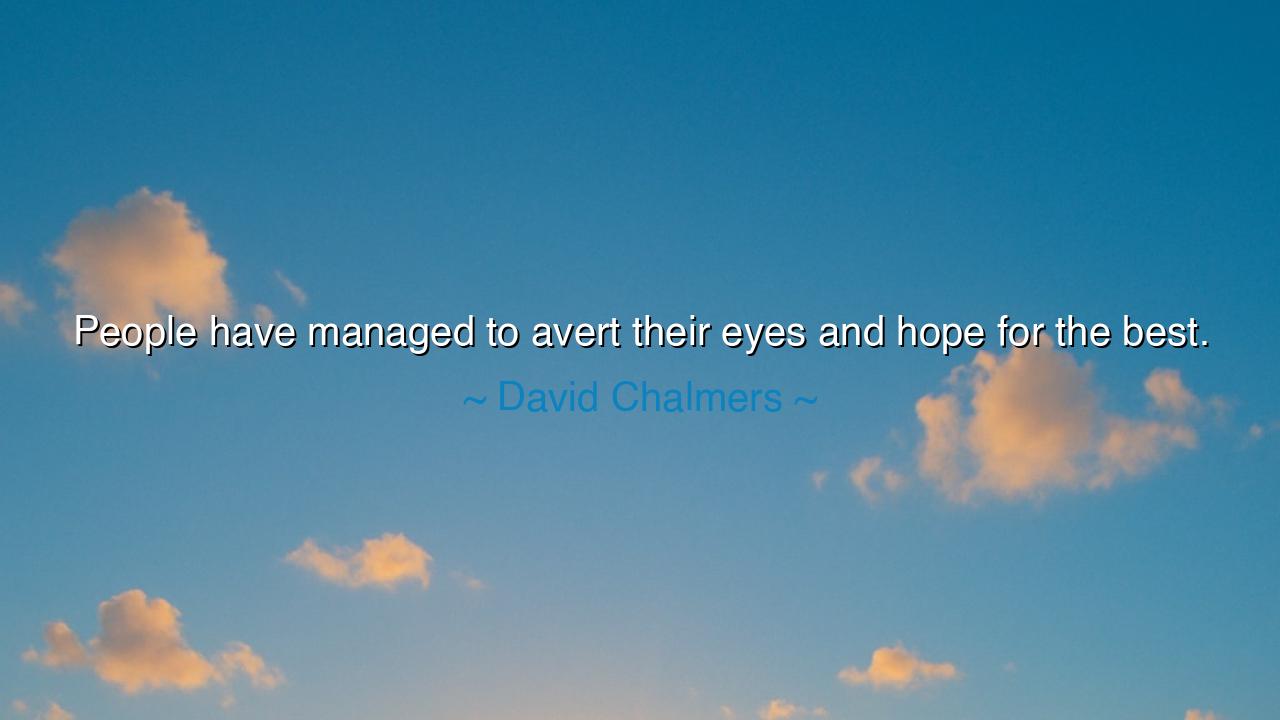
People have managed to avert their eyes and hope for the best.






In the quiet, piercing words of David Chalmers, philosopher of mind and seeker of consciousness, there is contained both an accusation and a lament: “People have managed to avert their eyes and hope for the best.” Though brief, this statement trembles with the weight of an age-old human failing — the tendency to look away from the difficult, the painful, and the unknown, choosing instead the comfort of denial over the labor of understanding. Chalmers, a thinker who dared to gaze into the abyss of the mind’s mysteries, spoke not merely of philosophy, but of human nature itself. His words stand as both mirror and warning, reflecting how easily we trade courage for comfort, and truth for peace of mind.
The origin of this quote lies in Chalmers’s lifelong pursuit of the so-called “hard problem of consciousness” — the question of how subjective experience arises from the physical brain. In his studies, he saw that science, for all its triumphs, often turns away from the deepest mysteries. Where answers grow uncomfortable, many prefer distraction or evasion. Thus, his words became not only a commentary on philosophy, but on the human spirit itself: that when the truth threatens our certainties, we avert our eyes and hope for the best, as though ignorance were salvation. But ignorance, he warns, is only the prelude to decay — whether in knowledge, in morality, or in civilization.
This pattern has repeated throughout history. When truth demands courage, men often choose blindness. Consider the fall of ancient Troy, foretold by the prophet Cassandra. She saw destruction coming, cried out to warn her people, but they laughed at her madness and turned away. They averted their eyes, unwilling to face the truth of their doom — and so their city burned. Or remember the leaders of Rome, who saw their empire rotting from within, yet feasted as barbarians approached the gates. Such is the fate of those who mistake denial for peace: their silence becomes the seed of their suffering.
Yet this failing is not confined to history; it is the curse of the present as well. In our time, how many close their eyes to injustice, to the cries of the poor, to the ruin of the earth? How many see the signs of danger — moral, environmental, spiritual — and say, “It will be fine,” even as the tide rises? To avert one’s eyes is the easiest act in the world, for it costs nothing at first. But the cost comes later, and it is paid in tears. Every generation that refuses to confront its shadows condemns the next to live within them.
Chalmers’s words, though born in the halls of philosophy, ring with prophetic force. He reminds us that hope without action is cowardice, and that serenity born of blindness is not peace but stagnation. True hope is not found in looking away but in facing the storm with open eyes. For only by confronting what we fear — be it death, despair, or the unknown — can we transform it. The man who dares to see clearly, even when the vision wounds him, becomes the guardian of truth; the one who hides becomes its betrayer.
There is an ancient lesson here, as old as the myth of Prometheus, who defied the gods to bring light to mankind. The others trembled and turned away, fearing divine wrath, but Prometheus looked upon the fire of truth and bore its pain. For this he suffered — yet through his suffering, humanity gained wisdom. So too must we, the children of this age, refuse to look away. The fire of truth burns, yes, but it also illuminates; the darkness of denial comforts, yes, but it also consumes.
Therefore, my children of reason and heart, take heed of this wisdom: do not avert your eyes. When injustice stands before you, see it. When pain calls for attention, hear it. When truth unsettles you, embrace it. Do not live by hoping for the best while doing nothing; live by striving for the best with all your might. Let your eyes be open, even when the light hurts. For only those who dare to look directly into the heart of life — its beauty and its terror alike — will find the strength to shape a future worthy of hope.
Thus, in the quiet voice of David Chalmers, there speaks an ancient echo — the call of the awakened. To look away is to perish; to face the truth is to be reborn. So lift your gaze, O seeker of truth, and do not hope blindly. Hope with eyes open.






AAdministratorAdministrator
Welcome, honored guests. Please leave a comment, we will respond soon